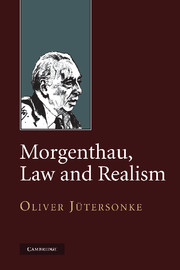Book contents
- Frontmatter
- Contents
- Preface
- Acknowledgements
- Note on the text
- 1 Hans J. Morgenthau in International Relations
- 2 The justiciability of disputes
- 3 Hans Kelsen and the reality of norms
- 4 Legal realism and behaviouralist social science
- 5 Legalism, romanticism and irresponsible statecraft
- 6 The legacy of legal formalism
- Name index
- Subject index
- References
6 - The legacy of legal formalism
Published online by Cambridge University Press: 17 November 2010
- Frontmatter
- Contents
- Preface
- Acknowledgements
- Note on the text
- 1 Hans J. Morgenthau in International Relations
- 2 The justiciability of disputes
- 3 Hans Kelsen and the reality of norms
- 4 Legal realism and behaviouralist social science
- 5 Legalism, romanticism and irresponsible statecraft
- 6 The legacy of legal formalism
- Name index
- Subject index
- References
Summary
The purpose of this book was not to present a comprehensive redescription of Morgenthau's thought, nor to assess the influence of his writings on academic and policy discourse in the United States. Rather, it attempted to emphasize the under-studied juridical dimension of Morgenthau's ideas, thereby highlighting the way many of their origins were occluded by standard renditions of Morgenthau that continue to apply him as an un-scientific precursor to more sophisticated theories of political realism subsequently generated. From a contemporary Political Science perspective, Morgenthau's approach was certainly ‘un-scientific’, to say the least, and the teacher of introductory courses to International Relations theory has every right to use Morgenthau as exemplary of a ‘classical’ version of ‘human nature realism’ based on the six principles added to the second edition of Politics Among Nations. Were it not for those six principles of realism and the success of that textbook, it is doubtful whether we would still be talking of Morgenthau today, and even more doubtful that he would be considered a ‘canonical’ thinker in International Relations. Grumble as he might about being misunderstood, even Morgenthau would have to accept that fact.
But casting Morgenthau aside as an easy-to-place anachronism does not help contemporary ambitions to offer a more critical approach to the way the field of International Relations has been writing its own ‘disciplinary history’ and has appropriated certain ‘classical’ thinkers for that purpose. The current ‘cottage industry’ rehabilitating Morgenthau, which I discussed in Chapter 1, is thus a welcome development.
- Type
- Chapter
- Information
- Morgenthau, Law and Realism , pp. 175 - 191Publisher: Cambridge University PressPrint publication year: 2010

